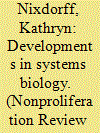| Srl | Item |
| 1 |
ID:
182965


|
|
|
|
|
| Summary/Abstract |
Biological processes occur within complex, vital physiological systems. Systems biology seeks to understand how physiological systems function as a whole, integrating information about interactions in a biological system through computer-assisted modeling, aiming to identify relationships not found within individual biological units. Coupled with advances in the life sciences and computing power, this research is yielding an enormous amount of information about specific targets of vital physiological processes, and enabling predictions about how these targets may respond to a disturbance or change in signaling. This information can be greatly beneficial in treating complex diseases. It also has extended the spectrum of potential threat agents to include bioregulators, which to a great extent regulate the functioning of the nervous, endocrine, and immune systems. There is potential for misuse of the knowledge gained from these studies, and improved methods of targeted delivery of biochemicals make them more feasible weapons agents. Moreover, biochemical security concerns in systems biology are embedded within the larger domain of cyberbiosecurity. There remains a need for proactive approaches to the formulation of biochemical-security-oversight policy that would encompass developments at this interface of the life sciences and information technology.
|
|
|
|
|
|
|
|
|
|
|
|
|
|
|
|
| 2 |
ID:
178082


|
|
|
|
|
| Summary/Abstract |
The convergence of the life sciences with the information and computing sciences is beginning to generate novel security vulnerabilities. As scientific and technological advances occur, new security vulnerabilities are discovered and new methods for exploiting those vulnerabilities are developed. Novel cyber-biological capabilities are likely to enable technologically sophisticated states to develop new methods of grey zone warfare. This article provides context to this multidisciplinary area of research by reviewing the emerging field of cyberbiosecurity for its relevance to developments in grey zone warfare. This article then analyses two long-term trends that have influenced the development of contemporary cyber-biological capabilities. These two trends are advances in novel uses of biology and advances in computing, automation and biodesign. The capability to exploit vulnerabilities unique to the links between cyber and biological systems differs significantly from previous security concerns noted for biotechnology and the life sciences. Scholars and practitioners of international relations will need to develop an understanding of engineering biology and the bioeconomy in order to forecast methods of grey zone manoeuvre that rely on cyber-biological capabilities. This article offers an entry point for the scholar and practitioner so that they may bring their own disciplinary lens to the issue of grey zone ambiguity and cyberbiosecurity.
|
|
|
|
|
|
|
|
|
|
|
|
|
|
|
|